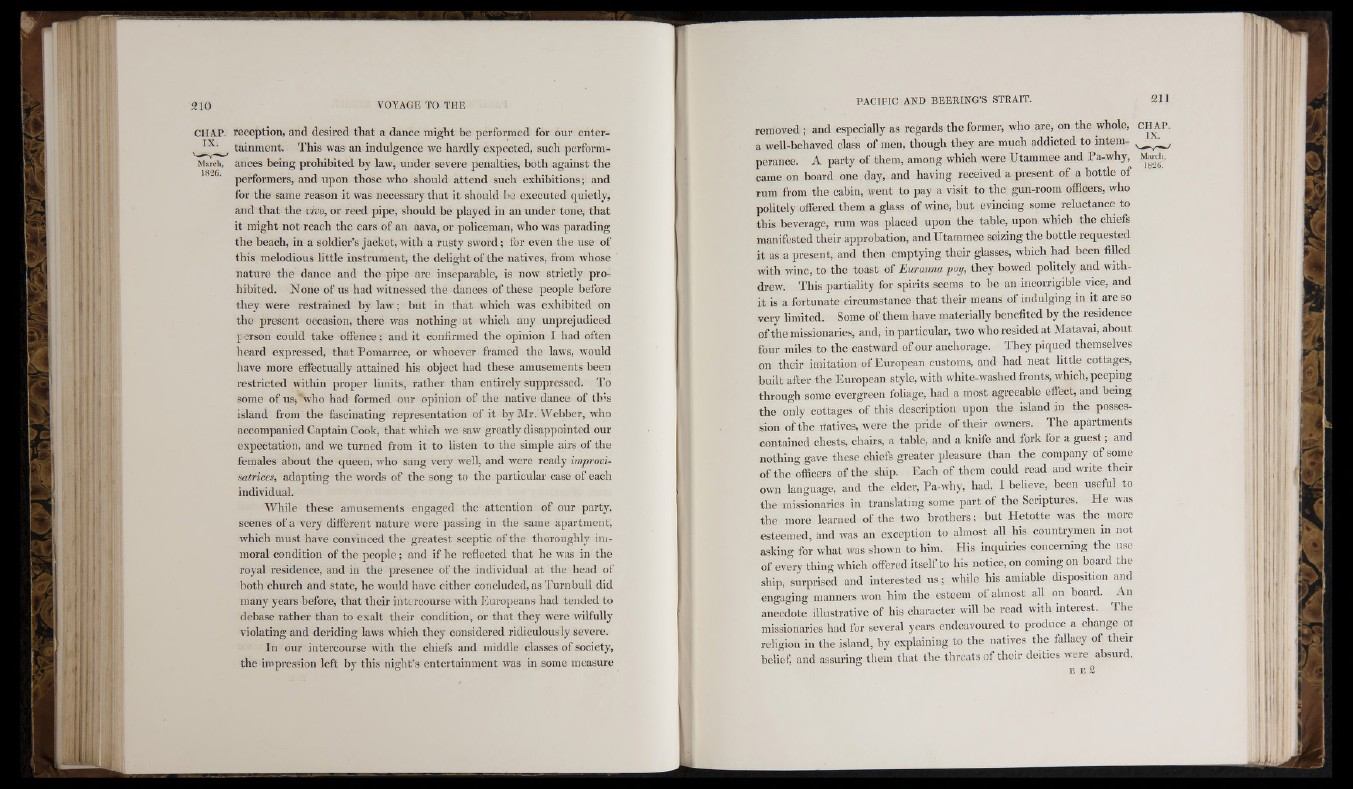
CHAP. reception, and desired that a dance might be performed for our enter-
tainment. This was an indulgence we hardly expected, such perform-
March, anccs being prohibited by law, under severe penalties, both against the
performers, and upon those who should attend such exhibitions; and
for the same reason it was necessary that it should 1m e.xecuted quietly,
and that the vivo, or reed pipe, should be played in an under tone, that
it might not reach the ears of an aava, or policeman, who was parading
the beach, in a soldier’s jacket, with a rusty sword; for even the use of
this melodious little instrument, the delight of the natives, from w'hose
nature the dance and the pipe are inseparable, is now' strictly prohibited.
None of us had witnessed the dances of these people before
they were restrained by law; but in that W'hieh was exhibited on
the present occasion, there was nothing at which any unprejudiced
p orson could take offence; and it confirmed the opinion I had often
heard expressed, that Pomarree, or w'hoever framed the laws, would
have more effectually attained his object had these amusements been
restricted within proper limits, rather than entirely suppressed. To
some of us. Who had formed our opinion of the native dance of tb's
island from the fascinating representation of it by Mr. Webber, w'ho
accompanied Captain Cook, that which we saw greatly disappointed our
expectation, and we turned from it to listen to the simple airs of the
females about the queen, who sang very well, and w'ere ready impivvi-
satrices, adapting the words of the song to the particular case of each
individual.
M"hile these amusements engaged the attention of our party,
scenes of a very different nature were passing in the same apartment,
W'hich must have convinced the greatest sceptic of the thoroughly immoral
condition of the people; and if he reflected that he was in the
royal residence, and in the presence of the individual at tlie head of
both church and state, he w'ould have either concluded, as Turnbull did
many years before, that their intercourse with Europeans had tended to
debase rather than to exalt their condition, or that they were wilfully
violating and deriding laws which they considered ridiculously severe.
In our intercourse with tlie chiefs and middle classes of society,
the impression left by this night’s entertainment was in some measure
removed ; and especially as regards the former, who are, on the whole, CH^P.
a well-behaved class of men, though they are much addicted to intern-
perance. A party of them, among w'hich were Utammee and Pa-why, M«rd.,
came on hoard one day, and having received a present of a bottle of
rum from the cabin, went to pay a visit to the gun-room officers, who
politely offered them a glass of wine, but evincing some reluctance to
this beverage, rum was placed upon the table, upon which the chiefs
manifested their approbation, and Utammee seizing the bottle requested
it as a present, and then emptying their glasses, which had been filled
with w ine, to the toast of Eurmtna pay, they bowed politely and withdrew.
This partiality for spirits seems to be an incorrigible vice, and
it is a fortunate circumstance that their means of indulging in it are so
very limited. Some of them have materially benefited by the residence
of the missionaries, and, in particular, two who resided at Matavai, about
four miles to the eastward of our anchorage. They piqued themselves
on their imitation of European customs, and had neat little cottages,
built after the European style, with white-washed fronts, which, peeping
through some evergreen foliage, had a most agreeable effect, and being
the only cottages of this description upon the island in the possession
of the natives, were the pride of their owners. The apartments
contained chests, chairs, a table, and a knife and fork for a guest; and
nothing gave these chiefs greater pleasure than the company of some
of the officers of the ship. Each of them could read and write their
own language, and the elder, Pa-why, had, I believe, been useful to
the missionaries in translating some part of the Scriptures. l i e was
the more learned of the two brothers; but Hetotte was the more
esteemed, and was an exception to almost all his countrymen in not
asking for what was shown to him. His inquiries concerning the use
of every thing w'hich offered itself to his notice, on coming on board the
ship, surprised and interested us; while his amiable disposition and
engaging manners won him the esteem of almost all on board. -An
anecdote illustrative of his character w'ill be read with interest. The
missionaries had for several years endeavoured to produce a change ot
religion in the island, by explaining to the natives the fallacy of their
belief, and assuring them that the threats of their deities were absurd.